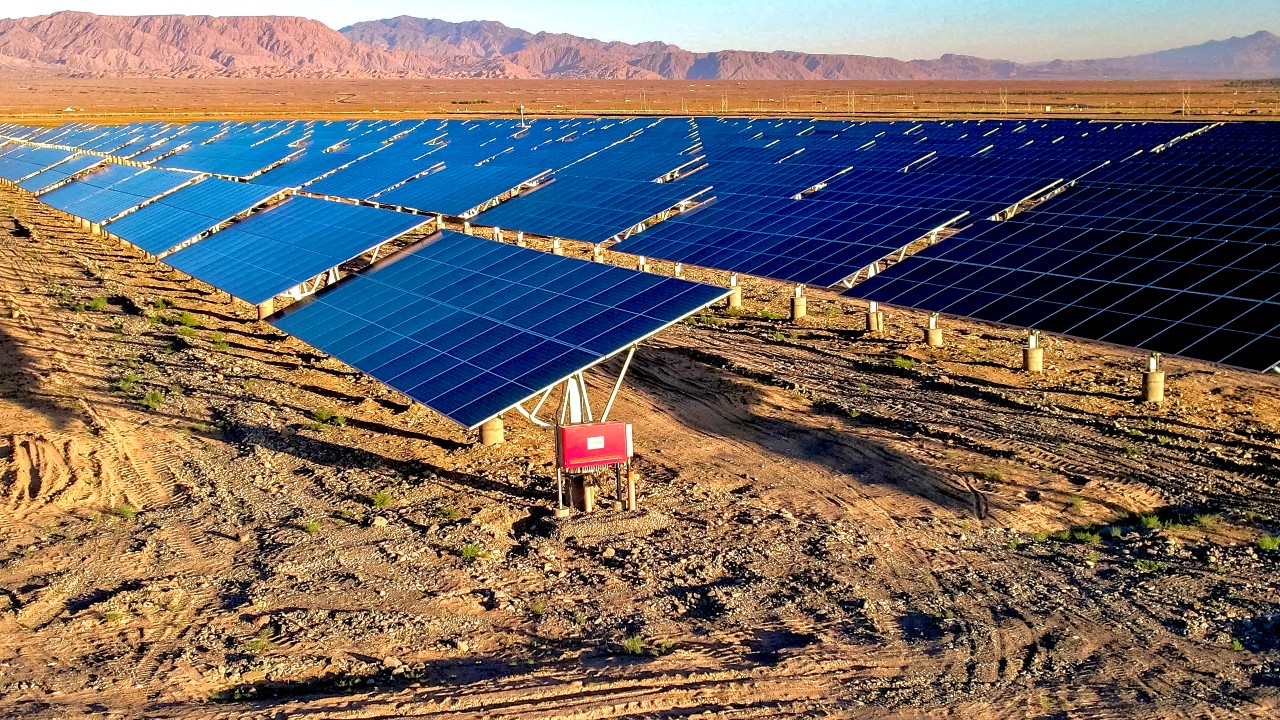
Image: GoodWe.
In order to meet the world’s growing energy needs in a sustainable manner, it is necessary to significantly expand the use of solar power technology in the coming years, and for the UK, transitioning to utility scale solar is essential. Accelerating this movement will allow the nation to reach its renewable energy targets and reduce its carbon emissions, while unlocking huge economic, environmental, and social benefits.
Utility-scale solar provides a cost-effective and reliable source of clean energy that can help the country to meet global energy demands while reducing the impacts of climate change. According to the International Energy Agency (IEA), in order to limit global warming to below 2 degrees Celsius and avoid the worst consequences of climate change, the global electricity sector must have reached net-zero emissions by 2040. Limiting global warming requires a significant expansion of large-scale carbon capture and storage technologies (CCS) and further development of renewable energy sources like wind and solar.
While there will ultimately need to be several sources of renewable energy to power the UK, utility scale solar has several advantages over other sustainable power supplies. For example, solar is extremely cost-effective compared to other renewable technologies. Wind power, though, is variable and requires large turbines. Hydroelectric generation meanwhile involves reservoirs and dams spread out over large areas. On the other hand, utility solar only needs a piece of land and low-maintenance equipment.
Steps to a utility-scale future
Decarbonising energy is key to achieving a sustainable economy and reducing emissions in line with the Paris Agreement on climate change. According to data from the International Renewable Energy Agency (IRENA), the global weighted average levelised cost of energy (LCOE) of newly commissioned utility-scale solar PV projects decreased by 13% in 2021, from USD 0.055/kWh to USD 0.048/kWh. As the price is likely to continue falling, the UK should look for opportunities to install and commission utility-scale solar now.
Considering the planning laws in effect in the UK, there must be some sort of agreement on the use of land. The National Farmers Union (NFU) has already said that some farm land should be given up for other purposes like solar generation. There needs to be a discussion about the impact on biodiversity and food production in the area around the farms along with proper planning and investment in infrastructure.
Without a well thought through strategy, there could be serious risk of floods, as well as impacting biodiversity and wildlife in surrounding areas. While these are legitimate concerns that should not be taken lightly, it is imperative that the UK overcomes all barriers to a net-zero future, something that is likely impossible without the power that can be generated by solar. It has been predicted that the utility sector of solar will see the biggest growth in the coming years. From 2021 to 2022, the UK saw an 80% increase in new solar photovoltaic (PV) installations – mostly a combination of residential, commercial and industrial. At the moment, there are comparatively few large solar farms in the UK meaning there is enormous potential for the solar industry to be part of the UK’s journey to Net Zero.
Without an increased presence of solar in the UK energy market, the UK runs the risk of becoming reliant on imports of fossil fuels from abroad. This, at a time when international pressures are being put on countries to reduce their reliance on fossil fuels and to move towards cleaner sources of energy such as renewables. Utility-scale solar in the UK would cause the price of energy to go down, create jobs and boost the economy, plus reduce our reliance on imported fossil fuels. Added to these benefits is the fact that utility-scale solar has little to no negative impact on local biodiversity and can even double as habitats for endangered species.
Next steps
For a healthier environment, a Net Zero UK, and a greener economy, the UK must invest in utility-scale solar power. The technology is available and easy to maintain and can provide unlimited free energy. Advancements and innovations are happening all the time in the industry, meaning that solar will only grow more efficient as developments are implemented.
In utility-scale inverters, it is possible to have full power generation up to 40 degrees Celsius, meaning the inverter will stay at its peak efficiency even at temperatures rarely seen in the UK. The technology for net zero is already available; it just needs to be applied.
With the world in need of better renewable energy, now is the time for the UK to transition to utility scale solar. Currently, solar energy makes up a very small percentage of the global energy supply. One of the most effective and environmentally beneficial technologies available, solar energy has virtually unlimited potential to cut greenhouse gas emissions and the use of fossil fuels. Renewables are the best way to become self-reliant as a nation and is a vital part of our path to net zero. With solar as a significant source of UK power, the UK will be able to provide cheaper, planet friendly energy, and become free from the increasingly unpredictable energy market.
